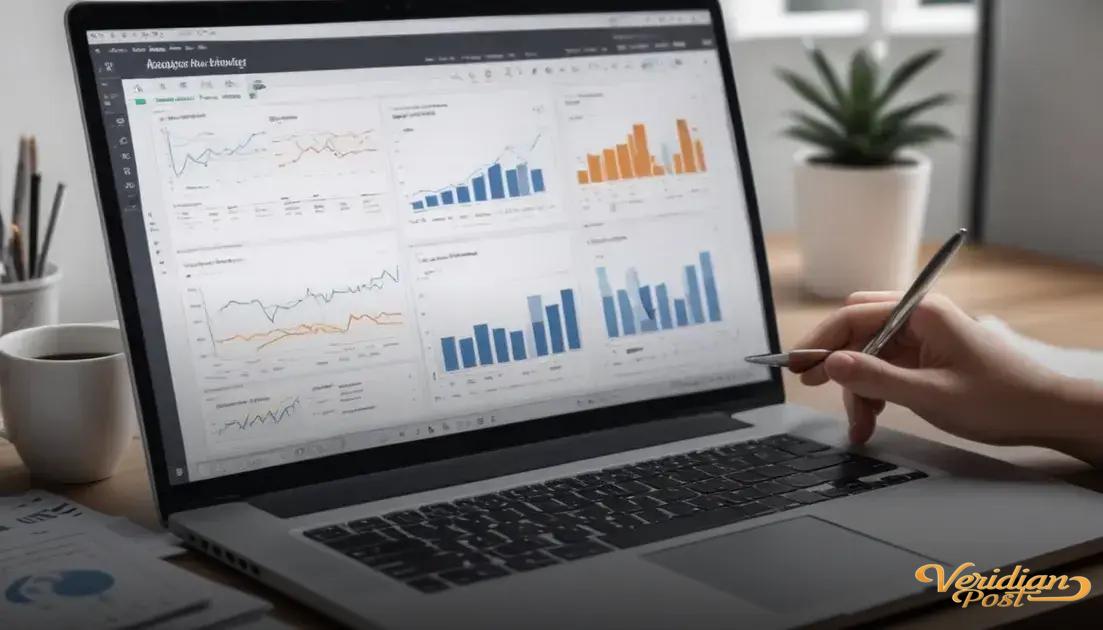ecommerce SEO techniques involve optimizing product pages, selecting targeted keywords, improving site speed and mobile usability, and building quality backlinks to boost online store visibility and rankings on search engines.
Have you ever wondered why some online stores pop up first in search results? ecommerce SEO techniques play a major role in making that happen. Let’s explore simple, effective strategies you can apply to bring more visitors to your store and boost sales.
understanding ecommerce SEO basics
Understanding ecommerce SEO basics is essential for boosting your online store’s visibility in search engines. It starts with knowing how search engines rank pages and what shoppers look for when browsing products. At its core, ecommerce SEO focuses on optimizing your site so that it appears when potential customers search for items you sell.
Key elements of ecommerce SEO
Keyword research helps identify the phrases shoppers use to find products. By targeting these keywords within your product titles, descriptions, and metadata, you improve your chances of ranking higher.
Site structure plays a vital role as well. Organizing your categories, subcategories, and product pages in a clear hierarchy helps both search engines and users navigate easily.
Content optimization ensures your product pages are informative and unique. Using relevant keywords naturally in descriptions, adding high-quality images, and including user reviews can increase engagement and trust.
Another important factor is technical SEO, which involves improving your site’s speed, mobile-friendliness, and secure connections (HTTPS). These aspects provide a better user experience and are favored by search algorithms.
Finally, link building from reputable websites can boost your domain authority and improve rankings. This can come from partnerships, influencer mentions, or quality content shared across the web.
choosing the right keywords for your store
Choosing the right keywords for your store is a critical step in ecommerce SEO. It begins with research to find terms your potential customers use when searching for products. Tools like Google Keyword Planner, Ahrefs, or SEMrush can help identify keywords with good search volume and manageable competition.
Focus on search intent
Understanding the intent behind a keyword is vital. Are shoppers looking to buy immediately, or just browsing? Keywords like “buy running shoes” show clear purchase intent, while “running shoe reviews” may indicate research phase. Targeting different intents can help capture a wider audience.
Long-tail keywords are specific phrases that often have lower competition and higher conversion rates. For example, instead of “running shoes,” use “best running shoes for flat feet.” Incorporating these into your product descriptions can attract more qualified visitors.
Be sure to include keywords naturally throughout your site, avoiding keyword stuffing which can harm your rankings. Focus on creating clear, helpful content that satisfies what users seek.
Regularly updating your keyword strategy based on trends and analytics will keep your store relevant and competitive. Pay attention to seasonal changes and new product launches to refine your approach.
optimizing product pages for search engines
Optimizing product pages for search engines involves multiple tactics to enhance visibility and drive sales. Start with unique and compelling product titles that include primary keywords naturally. Avoid generic names to stand out in search results.
Next, focus on creating detailed and informative product descriptions. Use clear language and add relevant keywords while keeping the content engaging and helpful for shoppers.
Including high-quality images is crucial. Optimize image file names and alt text with descriptive keywords, which helps search engines understand the content of your images and improves accessibility.
Another vital aspect is using structured data markup like Schema.org to provide search engines with more information about your product, such as price, availability, and reviews. This can enhance your search result listings with rich snippets.
Make sure your product pages load quickly and are mobile-friendly. A smooth user experience reduces bounce rates and signals search engines that your site is reputable.
improving site speed and mobile experience
Improving site speed is crucial for keeping visitors engaged and improving your search rankings. Faster-loading pages reduce bounce rates and create a better shopping experience. Start by optimizing images—compress files without losing quality and use modern formats like WebP.
Use caching to store parts of your site temporarily, so pages load quicker on repeat visits. Also, minimize CSS and JavaScript files by removing unnecessary code and combining files where possible.
Mobile experience matters just as much, as more customers shop from their phones. Ensure your site is responsive, meaning it adapts smoothly to different screen sizes. Large buttons, easy navigation, and legible text enhance usability on mobile devices.
Test your site with tools like Google PageSpeed Insights and Mobile-Friendly Test to identify areas needing improvement. Regularly updating your platform and plugins can also prevent slowdowns caused by outdated software.
Lastly, consider using a Content Delivery Network (CDN) to deliver your site’s content faster by distributing it across servers worldwide. This can significantly improve loading times for visitors far from your main server location.
building quality backlinks for ecommerce
Building quality backlinks is essential for improving your ecommerce site’s authority and search engine rankings. Backlinks from reputable websites signal to search engines that your store is trustworthy and valuable.
Strategies to gain quality backlinks
Create valuable content like blog posts, guides, or infographics that others want to share and link to. Unique and helpful resources attract natural backlinks.
Partner with influencers or bloggers in your niche to review your products or mention your store. These endorsements often come with high-quality backlinks.
Engage in guest posting on reputable websites related to your market. Writing helpful articles for other sites can include backlinks to your ecommerce store.
Utilize social media platforms to share your content widely, increasing the chances of it being linked by others.
Monitor your backlink profile using SEO tools to ensure links are from legitimate sources and disavow any harmful or spammy links that could hurt your SEO.
Wrapping up ecommerce SEO techniques
Using the right ecommerce SEO techniques is key to increasing your store’s visibility and sales. Each step, from choosing the right keywords to building quality backlinks, plays an important role in attracting more customers.
By optimizing product pages, improving site speed, and focusing on mobile experience, you create a seamless shopping journey that search engines and buyers appreciate.
Keep testing and updating your strategies to stay ahead in a competitive market. With patience and effort, your ecommerce store can reach new heights and connect with more eager buyers.
FAQ – common questions about ecommerce SEO techniques
What are ecommerce SEO techniques?
Ecommerce SEO techniques are strategies used to improve the visibility of an online store in search engine results to attract more customers.
How do I choose the right keywords for my ecommerce store?
Use keyword research tools to find relevant terms your customers search for, focusing on search intent and including long-tail keywords for better targeting.
Why is optimizing product pages important?
Optimized product pages with clear titles, detailed descriptions, and quality images help search engines understand your products and improve rankings.
How can I improve site speed for my ecommerce store?
Compress images, enable caching, minimize code, use a Content Delivery Network (CDN), and ensure your site is mobile-friendly to improve loading times.
What is the role of backlinks in ecommerce SEO?
Quality backlinks from reputable sites boost your store’s authority and help search engines trust your website, which improves rankings.
How often should I update my ecommerce SEO strategy?
Regularly update your SEO strategy by monitoring trends, analyzing performance data, and adapting to changes in search engine algorithms and customer behavior.

